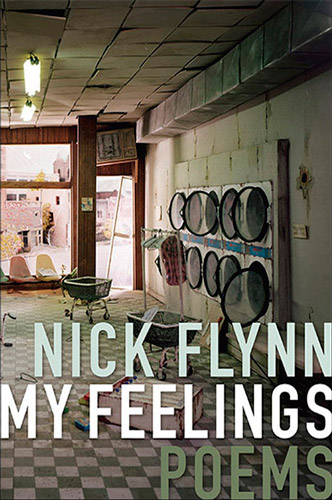My Feelings
My Feelings, the aptly primal title of poet and memoirist Nick Flynn’s fourth poetry collection, appropriately marks the book as the end product of long winnowing—an unequivocally subjective appraisal of life’s equivocations. In My Feelings, Flynn brings a memoirist’s robust conception of personal history to the page, crafting finely textured poems about what it means to live in the ever-growing aftermath called the present. To underscore the subjective nature of his collection, Flynn even includes a disclaimer telling readers that “[t]he word ‘my’ in the title is meant to signify the author.” My Feelings, the aptly primal title of poet and memoirist Nick Flynn’s fourth poetry collection, appropriately marks the book as the end product of long winnowing—an unequivocally subjective appraisal of life’s equivocations. In My Feelings, Flynn brings a memoirist’s robust conception of personal history to the page, crafting finely textured poems about what it means to live in the ever-growing aftermath called the present. To underscore the subjective nature of his collection, Flynn even includes a disclaimer telling readers that “[t]he word ‘my’ in the title is meant to signify the author.”
What the poems find Flynn feeling are the moderating effects of fatherhood while simultaneously trying to suss out his relationship to a long history of family trauma, addiction, and loss, which includes the suicide of his mother and the recent death of his father. Whether writing prose poems or astutely-lineated free verse, Flynn’s sturdy union of imagery and rhetoric creates poems whose emotional warmth and logical clarity lure the reader ever further along the tangled continuum of his haunted life.
In his short prose poem, “Forty-Seven Minutes,” the specter of Flynn’s past turns a brief classroom interaction between student and teacher into a parable about nihilism’s insidious attraction. After asking the students in a high school class to consider the significance of the images in a poem they’d just read, Flynn hears those three little words that speak to certain innate disaffections of his own:
After some back & forth about the rain & a styrofoam cup, a girl raises her hand & asks, Does it matter? I smile—it’s as if the universe was balanced on those three words & we’ve landed in the unanswerable & I have to admit that no, it doesn’t, notreally, matter, if rain is an image or rain is an idea or rain is a sound in our heads. But to get through the next forty-seven minutes we might have to pretend it does.
The fact that Flynn’s parable might not register to his students as such, and that his students aren’t privy to the details of his fraught past spent asking this very question, saturates the poem with dramatic irony and foreboding for these youngsters.
One of Flynn’s greatest strengths as a poet is his ability to let sensuous imagery spawn new lines of inquiry in a way that feels natural—his images never feel like baubles deployed to buoy contrived rhetoric. Perhaps the fullest flowering of this aspect of his craft comes in the poem “If This is Your Final Destination.” In the poem, Flynn’s travels with his young daughter on a week-long business trip cause him to reflect on the indelibility of childhood experience and the power of the dead to assume the form of objects associated with them. Sitting down to breakfast in a hotel restaurant with his jelly-loving little daughter, Flynn recalls mornings of his own childhood, killing time at a lunch counter in a darkened supermarket while his mother got it ready to open in the pre-dawn hours:
[ . . . ] I’d twirl or wander or
make toast, contemplating the basket
of butter and jelly, each in its little wasteful tub,
impervious to air or time or decay. Angel of Grape,
your purple body not only filled those coffins
but took the shape of those coffins—emptiness made
whole, color now a shape. Angel, my daughter now
wants only you, she asks for the whole basket, she
pulls back each sheet, puts her tongue in—
strawberry is her favorite, because it tastes
like strawberry.
This final intrusion of the past into the present, represented by the culminating image of the tongue zestfully piercing the bright red jelly, finds Flynn’s ability to meld potent imagery to human insight on dazzling display.
Flynn uses this ability in an even more complex way in his poem of ontological questioning, “Aquarium.” In the poem, Flynn ruminates on the solipsism and self-destructive behavior people fall into in lieu of fulfilling their impossible desire for total earthly communion with another. Beginning as a sort of visualization exercise designed to help elucidate the bounds of subjectivity, the reader is asked to “Imagine / an aquarium, one fish inside, slowly circling. / Imagine two cameras set up to film this.” Then the reader is told to imagine they have no knowledge where this room is and that they’re reduced to watching the image of this aquarium on a television where “the screen is split // so it seems you are watching two fish, but it is only / one” turning in unison with itself. With his sinuous description of this Twin Peaks’s pet shop display, Flynn pairs a scene of drugged-out teenagers on a double-date projecting onto each other their own desire to be, at least momentarily, in perfect unison with another person.
Again and again, Nick Flynn considers the immutable borders that provoke warring feelings in us. To the tension created by these borders standing between the present and the past, one consciousness and another, and between life and death, Flynn has written a powerful tribute.




